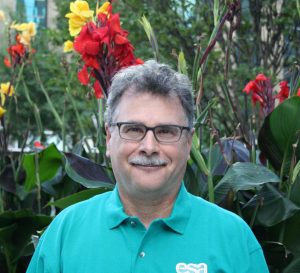Richard Pouyat named President of the Ecological Society of America for 2017-2018 term
Thursday, 21 September 2017
For Immediate Release
Contact: Alison Mize, 202-833-8773 ext. 205, gro.asenull@nosilA
 Rich Pouyat, National Program Leader for Air and Soil Quality Research, United States Forest Service became President of the Ecological Society of America (ESA) on August 11, 2017 during the Society’s annual meeting in Portland, Oregon.
Rich Pouyat, National Program Leader for Air and Soil Quality Research, United States Forest Service became President of the Ecological Society of America (ESA) on August 11, 2017 during the Society’s annual meeting in Portland, Oregon.
Elected by the members of ESA for a one-year term, Pouyat presides over the world’s largest professional society of ecologists. Its membership is composed of 9,000 researchers, educators, natural resource managers, and students, reflecting the diverse interests and activities of the Society. As President, Pouyat now chairs ESA’s governing board that establishes the Society’s vision, goals, and objectives.
“The amount of, and access to, environmental and ecological information is increasing exponentially, but it requires experts to interpret that information so it is used appropriately. And there is no better organization in the world than ESA to look to in providing ecological expertise,” said Pouyat.”
ESA’s five journals publish leading-edge ecological research, which often lead to discoveries to address societal challenges. Every year, ecologist gather in August to present research results at the Society’s annual meeting. In addition to research, the Society is committed to diversity and inclusiveness among its membership and to fostering ecologists’ career development in academia, government, and the private sector. Increasingly, ecologist are needed to apply ecological knowledge outside of the lab to inform sound ecological decisions made by local, state, and federally elected officials, nongovernmental organizations, and the business sector.
“Current environmental issues are potentially more cataclysmic than in the past, yet more subtle, and it’s hard for people to understand how these issues will affect their daily lives. Given these societal challenges, the Ecological Society of America is well poised to help find solutions based on science that safe guards the environment and at the same time provides the ecosystem services and economic benefits, which are crucial for human survival and wellbeing,” said Pouyat.
Pouyat’s career, which has taken him from the research world to Washington, reflects his commitment to both fundamental research and public policy. He served as an original Co-principal Investigator of the Baltimore Ecosystem Study; a Long Term Ecological Research site funded by the National Science Foundation. His training in ecology, soil science, and biogeochemistry to investigate urban ecosystems and the effect of urban sprawl on natural systems is extensive. Although much of his research has been “basic” in nature, he has a strong interest in applying research to the solution of contemporary problems in natural resource management and policy, and to integrate the ecological and social sciences.
“I am honored and excited to serve as President to a community of ecologists and professionals who are dedicated not only to advancing the science of ecology but also to solving societal problems,” said Pouyat.
On the science policy front, Pouyat recently served from 2016-2017 as Assistant Director of Climate Resilience and Land Use to the White House Office of Science and Technology Policy. During the earlier phase of his career, he brought his scientific training to Congress while working as a Legislative Assistant for Senator Daniel Patrick Moynihan (D-NY) in 1997 as part of the AAAS Congressional Science Fellowship program. While serving for Senator Moynihan, he co-authored Acid Deposition Control Act of 1997 (S. 1097) and provided scientific expertise for environmental and natural resource management policy issues. Additionally, he worked on a detail as a Legislative Assistant for Senator Dianne Feinstein (D-CA) working on complex environmental issues such as wildfire and endangered species.
Pouyat’ s wide-ranging experience is rounded out with stints with the Central Park Conservancy and Natural Resources Group of the New York City Department of Parks. He received his Ph.D. in ecology from Rutgers University and an M.S. in forest soils and B.S. in forest biology at the College of Environmental Science and Forestry.
The Ecological Society of America, founded in 1915, is the world’s largest community of professional ecologists and a trusted source of ecological knowledge, committed to advancing the understanding of life on Earth. The 9,000 member Society publishes five journals and a membership bulletin and broadly shares ecological information through policy, media outreach, and education initiatives. The Society’s Annual Meeting attracts 4,000 attendees and features the most recent advances in ecological science. Visit the ESA website at https://ecologicalsocietyofamerica.org.